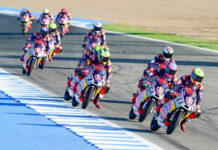FIRST PERSON/OPINION (Offered as the personal opinion of the author, not representing the views or opinions of any other person or organization. The author was first published in 1972, has been an active road racer since 1973, has been a winning race team owner since 1980, founded Roadracing World Publishing in 1990, has been the father of a professional racer since 1994, has raised hundreds of thousands of dollars to deploy soft barriers around the country through the non-profit Roadracing World Action Fund, and owns Roadracingworld.com.) The Situational Ethics Of Some Factory Teams By John Ulrich When it suits them, some factory team managers know what a factory team is. When it doesn’t suit them, they demand to know what the definition of a factory team is. Some of them make this demand even when the name of their team includes the phrase “Factory Racing.” When it suits them, as when they’ve got two riders leading the Supersport point standings and dropping a race will increase the odds that they’ll stay atop the point standings, a certain factory team manager may, for example, argue that it is unsafe to start a race that the vast majority of riders along pit lane want to start. When it suits them, the same factory team manager may also take his two riders to another track for a private test run with four cornerworkers and NO soft barriers, and never mind that one of those two riders bounced off an unpadded tire wall at said track and was injured not that many years ago. (If somebody tried to hold a race with the same lack of basic safety precautions, there would be a riot.) When it suits their perception of their own team’s immediate competitive advantage, some factory team managers will be in favor of anything. When something will benefit the entire paddock but also eliminate an expensive competitive advantage held by their own team, the same factory team managers may oppose it, like the factory team manager who said, during a discussion of spec fuel, “I’m against it because we get our fuel free.” What he really meant was, his team is getting a performance advantage by using custom-blend $500 a gallon rocket fuel (that incidentally made team mechanics physically ill on at least one race weekend), and he wants to continue getting that advantage. The fact that $6.25 a gallon non-oxygenated, stable spec fuel would save the paddock as a whole hundreds of thousands of dollars a year while also reducing the exposure of riders, mechanics and spectators to toxic and carcinogenic materials is of no apparent concern. Budget is power, which is why some factory team managers are against any effort to reduce the cost of racing. And to justify their budget, some factory team managers will do anything they can to assure that non-factory riders and teams with smaller budgets can’t be competitive. The most popular way of doing that, is to refuse to sell or otherwise provide factory parts, technology or bikes to non-factory riders and teams. Which brings us to the most effective way to identify what is and is not a factory team: Factory teams run trick motorcycles and parts that make a major performance difference, and which non-factory teams cannot get at any price, nor under any set of circumstances. At a recent AMA National race, riders for two different factory teams described their theoretically production-based Superbikes as being worth “$500,000” after those racebikes were heavily damaged in crashes. Follow the trick bikes and parts nobody else can get at any price, and you’ll find a factory team.
The State Of AMA Racing, Part Three
The State Of AMA Racing, Part Three
© 2007, Roadracing World Publishing, Inc.






